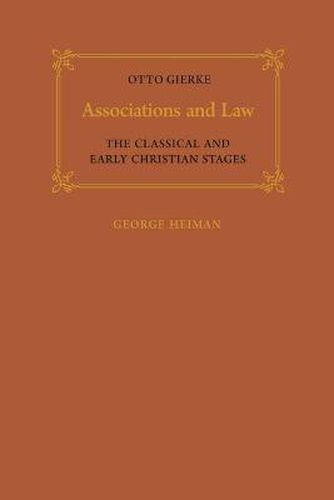Readings Newsletter
Become a Readings Member to make your shopping experience even easier.
Sign in or sign up for free!
You’re not far away from qualifying for FREE standard shipping within Australia
You’ve qualified for FREE standard shipping within Australia
The cart is loading…






George Heiman has translated the discussion of classical and early Christian laws of association from the major works by Grotto Gierke, Das deutsche Genossenschaftsrecht. This work complements F.W. Maitland’s translation of a later part under the title, The Political Theories of the Middle Ages, and E. Barker’s translation of the third part, Natural Law and the Theory of Society, 1500-1800. Professor Heiman thus has completed the circle in bringing into English the eminent German jurist’s historical analysis of the law.
Professor Heiman furthermore has introduced the work with substantial, detailed, and scholarly essays on Gierke’s work as a whole. He examines and explains Gierke’s concept of the group-person and his organic view of the association, society, and the state, and clearly outlines the conflict between individualist Roman and collectivist Germanic law. This introduction provides the first complete analysis in English of the philosophy of a major representative of the school of historical law and a jurist whose thinking is reflected in the general civil code adopted in Germany at the end of the nineteenth century. The book will interest political and social theorists as well as those concerned with jurisprudence and legal philosophy.
$9.00 standard shipping within Australia
FREE standard shipping within Australia for orders over $100.00
Express & International shipping calculated at checkout
George Heiman has translated the discussion of classical and early Christian laws of association from the major works by Grotto Gierke, Das deutsche Genossenschaftsrecht. This work complements F.W. Maitland’s translation of a later part under the title, The Political Theories of the Middle Ages, and E. Barker’s translation of the third part, Natural Law and the Theory of Society, 1500-1800. Professor Heiman thus has completed the circle in bringing into English the eminent German jurist’s historical analysis of the law.
Professor Heiman furthermore has introduced the work with substantial, detailed, and scholarly essays on Gierke’s work as a whole. He examines and explains Gierke’s concept of the group-person and his organic view of the association, society, and the state, and clearly outlines the conflict between individualist Roman and collectivist Germanic law. This introduction provides the first complete analysis in English of the philosophy of a major representative of the school of historical law and a jurist whose thinking is reflected in the general civil code adopted in Germany at the end of the nineteenth century. The book will interest political and social theorists as well as those concerned with jurisprudence and legal philosophy.